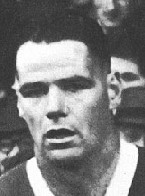 | |||
| Personal information | |||
|---|---|---|---|
| Full name | William Beveridge Liddell[1] | ||
| Date of birth | 10 January 1922 | ||
| Place of birth | Townhill, Fife, Scotland | ||
| Date of death | 3 July 2001 (aged 79) | ||
| Place of death | Liverpool, England | ||
| Position(s) | Winger | ||
| Youth career | |||
| 1936–1937 | Kingseat Juveniles | ||
| 1937–1938 | Lochgelly Violet F.C. | ||
| Senior career* | |||
| Years | Team | Apps | (Gls) |
| 1938–1961 | Liverpool | 492 | (215) |
| International career | |||
| Scotland Schoolboys | |||
| 1941–1942 | English League XI | 2 | (1) |
| 1942–1946 | → Scotland (wartime) | 8 | (3) |
| 1942 | Football Association XI | 1 | (1) |
| 1943 | Royal Air Force XI | 2 | (5) |
| 1945 | Scottish Services XI | 2 | (0) |
| 1946–1955 | Scotland[2] | 29 | (8) |
| 1947–1955 | Great Britain XI | 2 | (0) |
| 1955[3] | Scotland A vs B trial | 1 | (0) |
| *Club domestic league appearances and goals | |||
William Beveridge Liddell (10 January 1922 – 3 July 2001) was a Scottish footballer, who played his entire professional career with Liverpool. He signed with the club as a teenager in 1938 and retired in 1961, having scored 228 goals in 534 appearances (placing Liddell fourth and 12th in the respective club rankings as of June 2022). He was Liverpool's leading goalscorer in the league in eight out of nine seasons from 1949–50 to 1957–58,[4] and surpassed Elisha Scott's club record for most league appearances in 1957.
With Liverpool, Liddell won a league championship in 1947 and featured in the club's 1950 FA Cup Final defeat by Arsenal. He represented Scotland at international level on 29 occasions. While serving as a Royal Air Force navigator during the Second World War, Liddell continued his career by appearing in unofficial games for Liverpool and guesting for various teams in the United Kingdom and Canada. After his retirement from football, in 1961, Liddell occupied himself as a Justice of the Peace (from 1958), bursar of Liverpool University, and voluntary worker. He died in 2001.
Primarily a left winger, Liddell's versatility enabled him to play comfortably on the opposite wing and as a striker, at centre and inside forward. Liddell became noted for his strong physique, acceleration, powerful shot,[5] professionalism, and good conduct on the pitch.[6][7] Such was his influence and popularity that the club acquired the contemporary nickname "Liddellpool".[8] Posthumous recognition has included a plaque unveiled in 2004 at Anfield and sixth place in a poll of Liverpool fans, conducted in 2006 under the title "100 Players Who Shook The Kop". He was inducted into the Scottish Football Hall of Fame in November 2008.
- ^ "Billy Liddell". Barry Hugman's Footballers. Retrieved 21 May 2017.
- ^ Billy Liddell at the Scottish Football Association
- ^ Easter Road game should not have been played, Glasgow Herald (page 4), 22 February 1955
- ^ Keith, John (2005), pp. 302–5
- ^ Profile: Billy Liddell, lfchistory.net. Retrieved 29 April 2008.
- ^ Matthews, Tony (2006), p. 153
- ^ Ponting, Ivan (2001), Obituary: Billy Liddell, The Independent, 5 July 2001.
- ^ Anderson, Jeff (2004), The Official Liverpool FC Illustrated History, p. 51